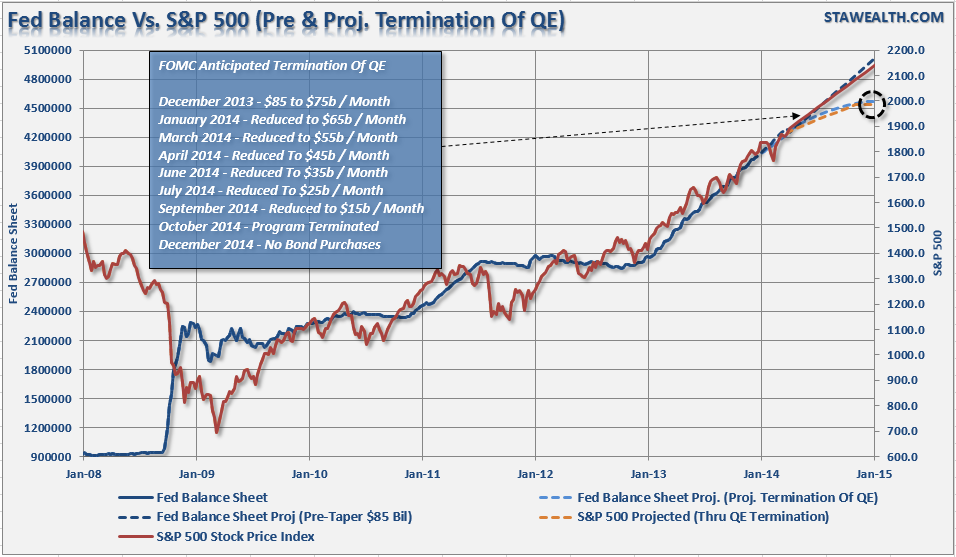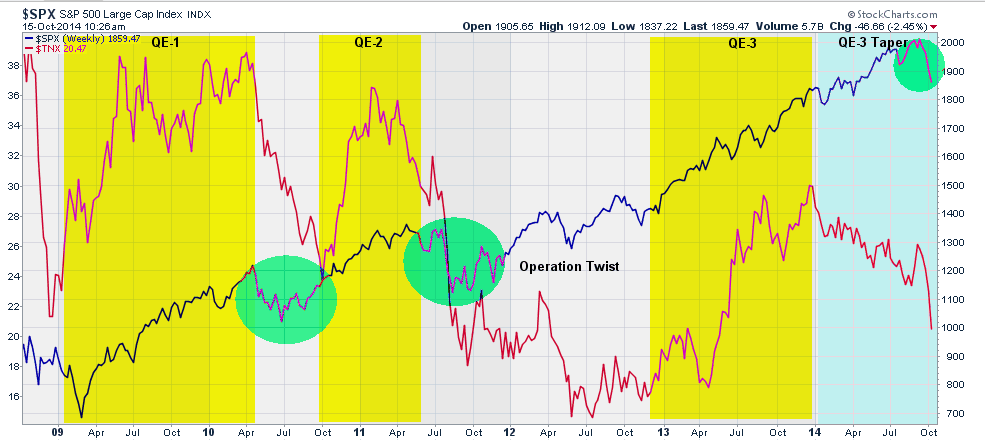It helps if you are Jeff Gundlach, founder of Doubleline Capital, because when you say something like, “interest rates will fall” in November, 2013, Forbes writes about it. Or, just this week, when he says, “we have seen the stock market top” -- both CNBC and Business Insider report on it. When you are a big player in the financial markets the media listens.
Alas, I am not Jeff or Bill, so when I make major market calls; they are like “trees falling in the woods.” The question of “did anyone hear them” resoundingly echoes in my mind.
For example, last year I began writing a series of articles about why interest rates were going to fall and that Bill Gross’ call for the “end of the bond bull market” was wrong. To wit:
“I have been very vocal since the beginning of June that now is a great time to be adding bonds to portfolios. There are several fundamental reasons for my belief that the recent rise in interest rates was more related to a short-term liquidation cycle rather than a shift in global economic sentiment.”
And most importantly I cited three reasons why interest rates would fall, however, most importantly:
“Money flows into U.S. Treasuries will likely increase as the slowdown in European, and Asian, economies seek safety and stability of the U.S.”
Of course, that is exactly what we have seen occur as China has slowed more markedly than expected; Japan has fallen into recession, and the Eurozone is on the brink of one.
In regards to the call of the “stock market top;” well I was ahead of the curve here, too, stating on August 2 that:
“With the Federal Reserve on the path of extracting liquidity from the markets, and threatening to begin raising interest rates next year, I suspect that we may have seen the top of the market for this year. As shown in the chart below, the high correlation between the expansion of the Fed’s balance sheet and the markets supports this assumption.”
I realize that this sounds like I am “tooting my own horn”and I guess I am a bit. However, the point is that by the time a change in market dynamics has occurred, it is too late to take advantage of it. This is the problem with being a contrarian investor,while identifying major issues in advance of their occurrence is the key to successful investing, it is also a timing problem. This is a point that Howard Marks eloquently stated:
“Resisting – and thereby achieving success as a contrarian – isn’t easy. Things combine to make it difficult; including natural herd tendencies and the pain imposed by being out of step, since momentum invariably makes pro-cyclical actions look correct for a while.(That’s why it’s essential to remember that 'being too far ahead of your time is indistinguishable from being wrong.)
Given the uncertain nature of the future, and thus the difficulty of being confident your position is the right one – especially as price moves against you – it’s challenging to be a lonely contrarian."
So, why am I telling you all of this? Because, yesterday, the media were “abuzz” with chatter about the Federal Reserve delaying the expected rate increases until late 2015. Via Reuters:
“John Williams, president of the San Francisco Fed, said in an interview with Reuters that the first line of defense at the central bank, if needed, would be to telegraph that U.S. rates would stay near zero for longer than mid-2015, when he currently expects them to rise.
If the outlook changes ‘significantly,’ with inflation showing little sign of returning to the central bank's 2-percent target, he said he would even be open to another round of asset purchases.”
And I recently penned the same thoughts in a discussion on the collapse of the economic growth and rising global deflationary pressures.
“The Federal Reserve is currently betting on a ‘one trick pony’ which is that by increasing the ‘wealth effect’ it will ultimately lead to a return of consumer confidence and a fostering of economic growth? Currently, there is little real evidence of success.”
The recent peak in the stock market comes precisely as predicted with the end of the Fed’s quantitative easing program. So does the ongoing flight to safety in U.S. Treasuries. Of course, this has all come as a complete shock to the vast majority of the analysts and economists on Wall Street who, for the past year, have been stating that “when the Fed ends QE, rates will rise and stocks will continue to climb higher.”
As shown in the chart below, history had already detailed what would happen – unfortunately, the warnings were mostly ignored.
So, here is my next macro predictions that will likely go just as unnoticed as all those in the past.
- The economy is going to begin to slow as the global deflationary pressures wash back onto the shores of the U.S. in the next two-quarters.
- The surging dollar will deflate corporate profitability as exports slip. Furthermore, the sharp decline in oil prices will begin to drag heavily on the energy sector as a race to “shut-in” high-cost production (shale wells) accelerates.
- Corporations will blame the shortfalls in earnings on the global weakness even though domestic weakness continues to be a problem.
- The Federal Reserve will voice more and more concern as the realization that 5.9% unemployment is not anywhere near full-employment when nearly 45% of working-age Americans are excluded from the workforce.
- Rising deflationary pressures, slower economic growth, stalling housing and falling stock prices will lead Fed officials to voice more concern about keeping interest rates low for an “extended period” well beyond 2015. This will lead to further discussions about the possibility of restarting bond purchases as well. However, with a deficit of less than $500 billion it may be more "Verbal Easing (VE)" than actual "QE."
Unfortunately, what will still go unnoticed by the majority of all, is that artificially low interest rates and bond purchase programs only mask the underlying economic weakness temporarily.
At some point, someone is going to have to realize that it is a “debt problem.” But then again, who am I kidding? Japan has been struggling with this issue for 30 years and still has not figured it out.


